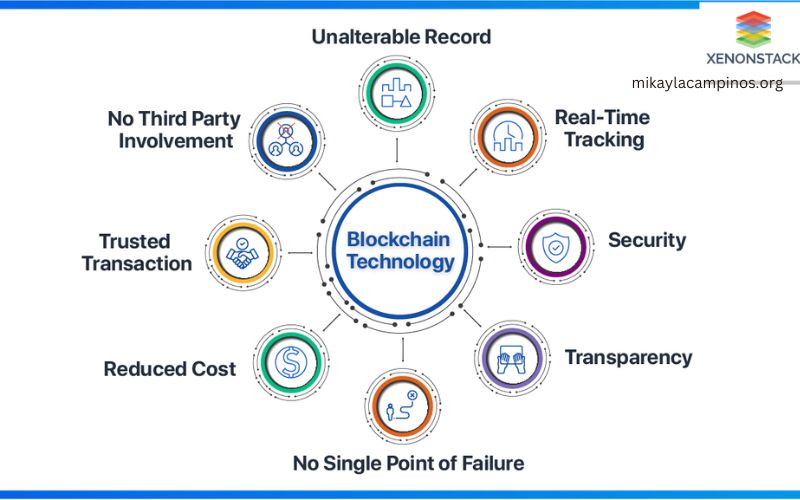Blockchain technology, once synonymous with cryptocurrency and its volatile market fluctuations, has quietly evolved into a multifaceted phenomenon with far-reaching implications. While many still associate blockchain with Bitcoin and other digital currencies, its true potential lies in its ability to revolutionize industries beyond finance. From supply chain management to healthcare records, and from intellectual property protection to secure voting systems, blockchain’s decentralized and transparent nature has the potential to disrupt traditional power structures and create new efficiencies. In this post, we’ll delve into the surprising purposes of blockchain technology, exploring its applications in industries that may not immediately come to mind, and examining the exciting possibilities that this technology holds for the future.
What is Blockchain technology?
At its core, blockchain technology is a secure and decentralized way of storing and verifying data. This revolutionary innovation was first introduced as the foundation of Bitcoin, the world’s first cryptocurrency, but its potential applications extend far beyond the realm of digital currencies. Imagine a digital ledger, shared and updated by a network of computers around the world, that allows for the creation of a permanent, transparent, and tamper-proof record of transactions. This is the essence of blockchain technology, and its implications are far-reaching and profound.
In a traditional database, data is stored and controlled by a single entity, such as a company or government. This creates a single point of failure, making it vulnerable to hacking, corruption, and manipulation. In contrast, blockchain technology is decentralized, meaning that data is stored and verified across a network of computers, rather than being controlled by a single entity. This decentralized approach makes it virtually impossible to hack or manipulate the data, ensuring its integrity and security.
But blockchain’s impact goes beyond just security and data integrity. Its use of distributed ledger technology and cryptography has the potential to transform industries, from finance and healthcare to supply chain management and voting systems. With its ability to enable secure, transparent, and efficient data exchange, blockchain technology is poised to revolutionize the way we live and work, and its applications are limited only by our imagination.
The rise of Crypto: How it’s connected to Blockchain
The rise of cryptocurrency has been nothing short of meteoric. From its humble beginnings as a niche concept to its current status as a global phenomenon, the world has been captivated by the idea of decentralized, digital currencies. And at the heart of it all is the technology that makes it possible: blockchain. In the early 2000s, blockchain was just a theoretical concept, a hypothetical framework for securing and verifying data. But as the internet began to evolve and traditional financial systems became increasingly vulnerable to hacking and fraud, the need for a secure and transparent way to record and verify transactions became more pressing.
It was in this landscape that the first cryptocurrency, Bitcoin, was born. Created by an anonymous individual or group using the pseudonym Satoshi Nakamoto, Bitcoin was designed to be a decentralized, peer-to-peer currency that could be used to buy and sell goods and services without the need for intermediaries. And at its core was blockchain, a decentralized, distributed ledger that recorded all transactions and ensured the integrity of the network.
As Bitcoin’s popularity grew, so did the development of blockchain technology. Other cryptocurrencies, such as Ethereum and Litecoin, emerged, each with their own unique features and applications. And as the technology continued to evolve, it became clear that blockchain was more than just a tool for cryptocurrency – it was a game-changer for a wide range of industries, from finance and healthcare to supply chain management and voting systems.
The surprising purpose of Blockchain technology beyond Crypto
As the world’s attention continues to be captivated by the rise of cryptocurrencies, it’s easy to overlook the fact that blockchain technology, the underlying infrastructure that enables these digital currencies, has a much broader scope of applications beyond the realm of cryptocurrency. In fact, blockchain’s decentralized and secure nature makes it an attractive solution for a wide range of industries, from healthcare to finance to supply chain management.
One of the most surprising purposes of blockchain technology is its use in tracking and managing food safety. Imagine being able to trace the origin of every piece of produce or meat product from farm to table, ensuring that every step of the supply chain is transparent and accountable. This is exactly what blockchain technology is doing, providing a secure and tamper-proof record of every transaction, from harvesting to distribution. This not only improves food safety but also reduces waste and increases efficiency in the supply chain.
Another surprising application of blockchain technology is in the field of healthcare. By creating a secure and decentralized record of patient data, healthcare providers can ensure that patients’ medical records are accurate, up-to-date, and accessible to authorized personnel. This reduces the risk of medical errors, enables seamless sharing of medical information across healthcare providers, and enhances patient care.
These examples illustrate the vast potential of blockchain technology beyond its association with cryptocurrency. As the technology continues to evolve, we can expect to see even more innovative applications across various industries, revolutionizing the way we do business and improving our daily lives.
Use cases of Blockchain technology in industries
Beyond the realm of cryptocurrency, blockchain technology has been quietly revolutionizing industries far and wide. From supply chain management to healthcare, and from finance to government, the applications of blockchain are numerous and far-reaching. One of the most striking examples of blockchain in action is in the world of supply chain management. By tracking goods from farm to table, blockchain technology can ensure the authenticity and origin of products, reducing the risk of counterfeiting and improving transparency.
In the healthcare sector, blockchain is being used to secure patient data, enabling medical records to be stored and shared securely, while also promoting data sharing and collaboration between healthcare providers. The technology is also being used to streamline clinical trials, ensuring that data is accurate and trustworthy.
In the finance sector, blockchain is being used to create decentralized platforms for trading, reducing the need for intermediaries and increasing efficiency. In government, blockchain is being used to create secure and transparent voting systems, ensuring the integrity of the electoral process.
These are just a few examples of the many use cases of blockchain technology in industries. As the technology continues to evolve and mature, it’s likely that we’ll see even more innovative applications across a wide range of sectors. Whether it’s securing digital identity, tracking intellectual property, or facilitating international trade, the potential of blockchain technology is vast and exciting.
Supply chain management: A prime example of Blockchain technology
Beyond the realm of cryptocurrency, Blockchain technology is quietly revolutionizing the way we do business, and one of the most fascinating applications of this technology is in supply chain management. Imagine a scenario where every step of the production process, from raw materials to final product delivery, is transparently tracked and recorded in real-time, allowing for unparalleled accountability and efficiency. This is the reality of Blockchain technology in supply chain management, where a decentralized and immutable ledger is used to record every transaction, shipment, and inventory movement.
By leveraging Blockchain, companies can streamline their supply chain operations, reduce costs, and enhance customer satisfaction. For instance, a manufacturer can use Blockchain to track the origin of raw materials, ensuring that they meet the required quality and sustainability standards. As goods move through the production process, each step is recorded and verified, providing a tamper-proof audit trail that can be accessed by all stakeholders. This not only reduces the risk of counterfeiting and tampering but also enables businesses to respond quickly to any issues or recalls, minimizing the impact on their reputation and bottom line.
How Blockchain technology improves transparency and accountability
At the core of blockchain technology lies the promise of transparency and accountability, revolutionizing the way data is stored, shared, and verified. Gone are the days of opaque systems and untrustworthy intermediaries, as blockchain’s decentralized and tamper-proof nature ensures that every transaction, action, and record is recorded on a public ledger, making it accessible to all. This unprecedented level of visibility and accuracy enables stakeholders to scrutinize the entire process, from inception to execution, fostering a culture of trust and accountability.
Imagine a supply chain where every shipment, every inventory update, and every payment is tracked in real-time, offering a clear and unobstructed view of the entire process. This is not wishful thinking, but the reality of blockchain technology in action. By implementing blockchain, industries can now monitor every step of the value chain, ensuring that goods are authentic, and that parties are held accountable for their actions.
In the world of finance, blockchain’s transparency and accountability enable unprecedented levels of due diligence, allowing investors to track the origin and movement of assets, ensuring that transactions are secure, and that financial institutions can be trusted to operate with integrity. No longer will investors be left wondering about the custodianship of their assets or the integrity of financial institutions.
The role of Blockchain technology in healthcare
In the realm of healthcare, Blockchain technology has been quietly revolutionizing the way medical records are stored, secured, and shared. This is a critical development, as the traditional model of storing patient data has been plagued by issues of data silos, security breaches, and accessibility concerns. With Blockchain, healthcare providers can now securely store and share patient data, while maintaining complete transparency and control over who has access to it.
Imagine a system where medical records are decentralized, allowing patients to take control of their own data and granting them the ability to share it with healthcare providers and researchers with ease. This is no longer a distant future, thanks to the advent of Blockchain technology in healthcare. With the use of Blockchain, medical records can be stored on a secure, distributed ledger, making it virtually impossible for hackers to access or manipulate sensitive information.
Furthermore, Blockchain technology has the potential to streamline the process of medical research, allowing researchers to access anonymized data and conduct more accurate studies. This, in turn, can lead to faster breakthroughs and more effective treatments for patients. The possibilities are vast, and the potential for Blockchain technology to transform the healthcare industry is undeniable. As the use of Blockchain technology continues to grow, it’s likely that we’ll see a significant shift in the way healthcare providers approach patient data, and the benefits to patients will be substantial.
Smart contracts and their applications
One of the most fascinating and rapidly evolving aspects of blockchain technology is the concept of smart contracts. Essentially, smart contracts are self-executing programs that automate the enforcement and implementation of a specific agreement or protocol. This revolutionary innovation has far-reaching implications, extending beyond the realm of cryptocurrency and into various industries, such as supply chain management, insurance, and even healthcare.
Imagine a scenario where a shipment of goods is in transit, and the payment terms are tied to the delivery of the goods. With smart contracts, the payment can be automatically released once the goods are confirmed to have been received, ensuring that the payment is only made when the terms of the agreement have been met. This eliminates the need for intermediaries, such as lawyers and banks, and reduces the risk of disputes and delays.
In the insurance sector, smart contracts can be used to create self-executing policies that automatically trigger compensation payments when a predefined condition is met, such as a natural disaster. This not only speeds up the claims process but also reduces the administrative burden on insurance companies.
In the healthcare industry, smart contracts can be used to manage patient data and medical records, ensuring that sensitive information is only shared with authorized parties and that patients have control over who can access their information. The potential applications of smart contracts are vast, and it’s likely that we will see them integrated into various aspects of our lives in the near future.
The potential of Blockchain technology in education
The potential of Blockchain technology in education is a game-changer, and it’s an area that’s often overlooked. Imagine a digital diploma that’s secure, tamper-proof, and verifiable. No more concerns about diploma mills or fake credentials. This is just the beginning. Blockchain technology can be used to create digital portfolios for students, showcasing their skills and achievements in a secure and transparent way. This not only benefits students but also employers, who can verify the authenticity of qualifications with ease.
In addition, Blockchain technology can be used to create decentralized learning platforms, allowing students to learn from experts worldwide, without the need for intermediaries. This democratizes access to education, making it more accessible to those who may not have had the opportunity to pursue higher education otherwise.
Moreover, Blockchain technology can help to reduce the administrative burden on educators, freeing up more time for teaching and mentoring. Automating tasks such as grade tracking, record-keeping, and transcript management can help to streamline the educational process, making it more efficient and effective.
The possibilities are endless, and it’s exciting to think about the potential impact Blockchain technology can have on the education sector. By leveraging this technology, we can create a more equitable, efficient, and effective learning environment, ultimately empowering students to achieve their full potential.
The future of Blockchain technology: Trends and predictions
As the world continues to evolve, the scope of Blockchain technology’s potential uses is expanding exponentially. Gone are the days when Blockchain was solely associated with the world of cryptocurrencies. Today, its applications are being explored in a wide range of industries, from finance to healthcare, supply chain management to voting systems. The future of Blockchain technology is promising, and experts are predicting a slew of innovations that will revolutionize the way we live and work.
One of the most exciting trends is the increasing adoption of Blockchain technology in the healthcare sector. With the ability to securely store and manage sensitive medical records, Blockchain has the potential to streamline patient care and improve treatment outcomes. Additionally, the use of Blockchain in supply chain management is expected to increase, as it enables real-time tracking and verification of products, reducing the risk of counterfeiting and improving efficiency.
Furthermore, the rise of decentralized applications (dApps) is also expected to play a significant role in the future of Blockchain technology. These applications are built on Blockchain platforms and are decentralized, meaning they are not controlled by a single entity. This has the potential to disrupt traditional industries and create new business models.
The future of Blockchain technology is also expected to be shaped by the increasing use of artificial intelligence (AI) and machine learning (ML) in its development. As AI and ML algorithms are integrated into Blockchain, it is expected to improve the efficiency, scalability, and security of the technology.
In conclusion, the future of Blockchain technology is bright, with a wide range of applications and innovations on the horizon. As the technology continues to evolve, it is expected to have a profound impact on various industries and aspects of our lives.



